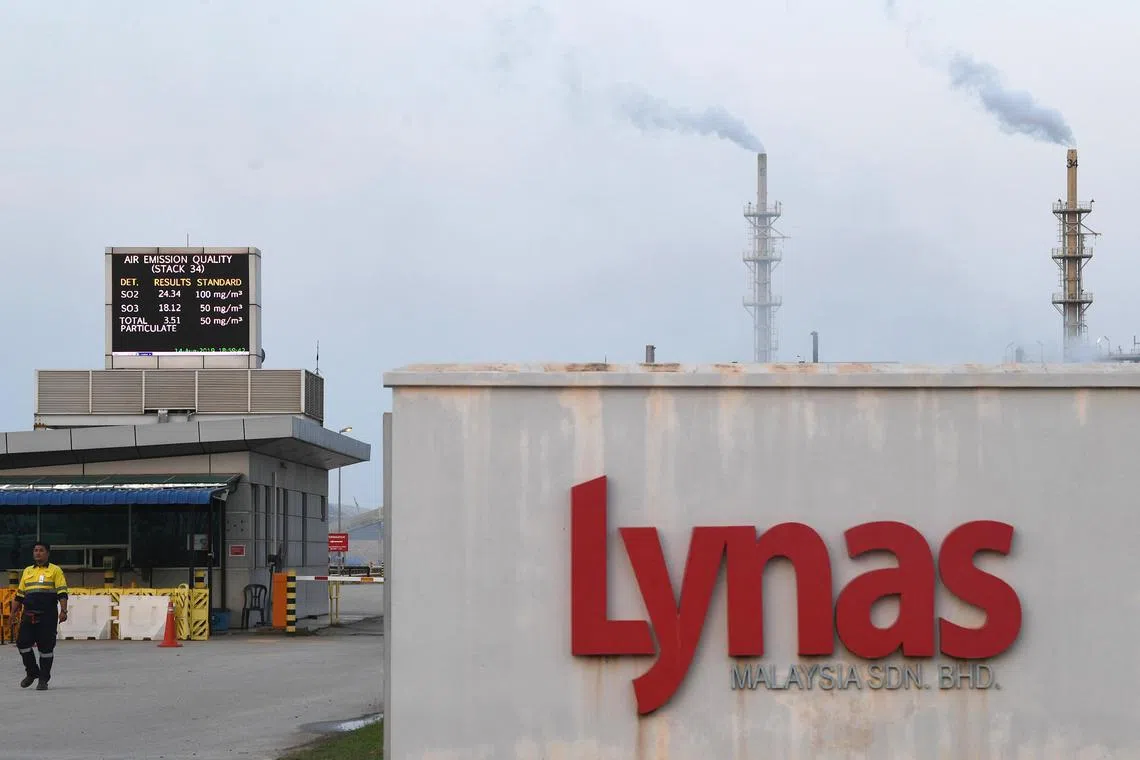Malaysia to insist rare earths miner Lynas go radiation-free by July
Sign up now: Get insights on the biggest stories in Malaysia

The Malaysian government has refused Lynas' request to lift conditions for the three-year renewal of its licence, which expires next month.
PHOTO: BERNAMA
Follow topic:
KUALA LUMPUR - The Pakatan Harapan-led (PH) government will seek to close the circle on one of its most controversial decisions from its first stint in power by forcing Australian rare earths miner Lynas to ensure radiation-free operations at its Malaysian plant by July.
The Straits Times has learnt that Prime Minister Anwar Ibrahim’s administration refused a request by Lynas – the largest producer outside of China of the highly sought-after minerals – to lift conditions for the three-year renewal of its licence, which expires in March.
“The Cabinet has decided to reject the request. Lynas will no longer be allowed to produce radioactive waste in Malaysia,” a top government figure said on condition of anonymity, as an official announcement is due only later in February.
The conditions, which come into force in July, include moving “cracking and leaching” of lanthanide concentrate offshore and only refining intermediate materials at the facility in Gebeng, near Kuantan in Pahang.
This would mean that, other than the existing heap of more than half a million tonnes, no further low-level radioactive waste would be allowed to accumulate at the factory.
In an investor briefing last month, Lynas said it is on course to meet the July 1 deadline but had contingency plans in case its refinery in Kalgoorlie, Western Australia, is not completed in time.
Managing director Amanda Lacaze said her firm was in talks with Malaysian atomic energy regulators on lifting the conditions as it had proven that its operations were not a health hazard.
But ST has learnt that the Atomic Energy Licensing Board had already informally informed Lynas of the government’s decision this week.
The company will have 30 days to appeal to Science, Technology and Innovation Minister Chang Lih Kang after being notified officially.
A potential closure of the S$1 billion facility would not just be a huge blow to Lynas – which has yet to fire up other production plants – but will also impact the geopolitically sensitive supply of rare earths crucial to high-technology applications such as mobile phones, rechargeable batteries and military assets.
Lynas accounts for one-tenth of global output, with China controlling 80 per cent of worldwide production.
Sources told ST that various diplomats, including envoys from the United States, Australia, Japan and the European Union, have lobbied Mr Chang in recent weeks to ensure the production of half of non-Chinese sourced rare earths is not disrupted.
Lynas had faced stiff public resistance when it first made plans to set up in Malaysia over a decade ago, sparking fears that there would be a repeat of toxic radiation that previous rare earth projects had caused in Malaysia.
PH campaigned hard against the project, promising in the run-up to the 2018 election to reverse the then Barisan Nasional regime’s decision to green-light Lynas’ operations.
However, after PH took power in 2018,
This raised public ire and contributed to growing tensions within the PH coalition that eventually led to its downfall in March 2020,
Then Energy, Science, Technology, Environment and Climate Change Minister Yeo Bee Yin, a staunch Lynas critic, had initially insisted the Australian firm repatriate its waste.
But in 2019, then Premier Mahathir Mohamad announced that Lynas could instead explore a permanent disposal facility.
It was later revealed that Tun Dr Mahathir had wanted to sack Ms Yeo from the Cabinet due to her dissent over the issue.
Just days before Dr Mahathir was ousted in February 2020, it was announced that the government had given Lynas a three-year permit on the condition that cracking and leaching would be moved out of Malaysia, and a waste disposal site developed within a year.
ST understands that the permanent disposal facility – being built by a company controlled by Pahang Regent Hassanal Abdullah, the son of Malaysia’s current King Abdullah Ahmad Shah – is now about 30 per cent complete.
Sources also revealed that Mr Chang, having inherited the legacy issue from Ms Yeo, wants to draw a line in the sand by giving Lynas a “shape up or ship out” ultimatum.
The vice-president from Datuk Seri Anwar’s Parti Keadilan Rakyat is scheduled to brief MPs on Wednesday.
When contacted, Mr Chang said he would make the appropriate announcement in due course.
A senior official said: “The government would be happy to be part of the rare earths supply chain, but not at the cost of public support while political intrigue is still elevated.”
Six state elections involving about half of Malaysia’s electorate are due by the middle of the year,


